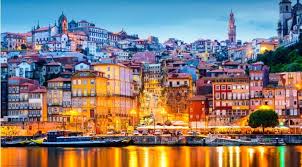Pros and Cons of Living in Portugal in 2025

Portugal has long been seen as one of Europe’s most welcoming destinations for expats – and the numbers back it up.
An estimated 14,000 Americans now call Portugal home. While that may only be around 0.1% of the total population, it represents a staggering 230% increase since 2017.
That growth hasn’t happened by accident.
From the sun-soaked Algarve to the cobbled charm of Lisbon and Porto, Portugal has become a magnet for those seeking a safer, slower, more affordable lifestyle in a country that still offers EU access, strong residency programs, and global mobility.
But Portugal’s rise in popularity hasn’t been without friction.
The winding down of the popular golden visa program – particularly the property investment route – has forced some potential expats to look elsewhere.
Rising real estate prices, an increasingly saturated rental market, and complaints about red tape and bureaucratic inertia have all reinforced those concerns.
In 2025, the reality is clear: Portugal offers an enviable lifestyle, but it’s no longer the undiscovered gem it once was.
At Nomad Capitalist, we don’t believe in following the crowd. We believe in strategic relocation, which means understanding why you want to move, weighing the upsides and downsides, and figuring out whether Portugal truly aligns with your goals.
For some, Portugal is still one of the best places to start a new chapter. For others, there may be better fits.
In this guide, the Nomad Capitalist team walks you through the key pros and cons of living in Portugal in 2025. We’ll also look at your options for legal residency – from the D7 and D8 Visas to alternative routes that might better suit your lifestyle, business, or retirement plans.
Pros of Living in Portugal
Portugal is loved for its natural beauty vibrant culture, rich history, mild climate and Portuguese cuisine.
Deciding if you want to move to Portugal or not requires a good understanding of the fundamentals.
Let’s start with the pros:
Access to Europe and the Schengen
As a Portuguese resident, you can enjoy visa-free travel throughout the EU Schengen Area, a massive upside for expats from all walks of life.
As travel access to the European Union and other parts of the West is becoming more restricted, being able to freely travel and do business within the region for an extended period is a massive benefit of gaining residency in Portugal.
Whether you are a retiree looking to explore the cultures and historical sites of Europe or an entrepreneur and investor looking for portfolio diversification, Portugal is a superb launchpad into the wider EU market.
Lifestyle in Portugal
Like its Mediterranean counterparts, Portugal offers a laid-back lifestyle and an emphasis on
a slower, more enjoyable pace of life.
Because so many expats have flocked to Portugal, more people there speak English, and there are international schools for families in major cities and networking opportunities for entrepreneurs.
The locals are welcoming and friendly, adding to an overall feeling of ease.
Safety in Portugal
Many expatriates in Portugal report a strong sense of peace and security in their daily lives.
Portugal ranks 7th on the Global Peace Index, making it one of the safest countries in the world. Such a high level of safety is a significant consideration for families and retirees seeking a secure international destination.
Portugal has a low overall crime rate and violent crime is infrequent. However, common sense is needed when travelling, as incidents of pickpocketing and bag-snatching do occur, particularly in high-traffic areas such as trams and metros in Lisbon and Porto.
Climate in Portugal
Portugal’s beautiful and diverse landscapes are complemented by a climate that many find appealing.
Portugal enjoys a Mediterranean climate, with over 300 days of sunshine. The average annual temperature ranges from 8°C to 12°C (46°F to 54°F) in the North and 16°C to 18°C (61°F to 64°F) in the South.
Temperatures in the Algarve often reach highs above 30°C (86°F) during the hot and dry summer months. Heading North to Porto means cooler and wetter winters, although Portugal rarely experiences snow.
The Atlantic Ocean plays a significant role in shaping Portugal’s weather patterns, which means cooler water temperatures in some areas. It also brings breathtaking coastal views and some of the best surf spots in the world.
Cost of Living in Portugal
Portugal has traditionally been more affordable than many parts of the US and other Western European countries, though it’s important to note that prices (particularly for renting or buying property) are increasing.
Nomad Capitalist Background
Nomad Capitalist Action Plan
Legally Reduce Your Taxes and Diversify Your Wealth
Nomad Capitalist has helped 1,500+ high-net-worth clients grow and protect their wealth safe from high taxes and greedy governments. Learn how our legal, holistic approach can help you.
BECOME A CLIENT NOW
The average cost of renting a one-bedroom apartment in Lisbon is €1,400, and buying real estate costs an average of €6,424 per square meter. Faro is considerably cheaper, with an average rent of €983 and an average purchasing price of €3,216 per square meter.
The cost of utilities is also reasonable, averaging around €115 per month. High-speed internet ranges from €30 to €50, while mobile data costs about €18. Groceries are affordable, no matter where you live in Portugal, especially fresh produce from local markets.
Living in Portugal is generally 40% cheaper than in the US. Housing costs follow a similar pattern, and rent in Portugal is about 70% less. For a full breakdown, see our guide to living in Portugal versus the US.
Cons of Living in Portugal
Depending on where you decide to live or how long you stay learning Portuguese may be necessary.
As we can see, Portugal has some compelling benefits, but it isn’t without its drawbacks.
Here are some common challenges faced by expatriates:
Portuguese Resident Income Tax
Changes in 2023 left expats exposed to the full brunt of the Portuguese tax system.
With the end of the Non-Habitual Resident Scheme (NHR), if you become a tax resident in Portugal, your worldwide income will be taxed at progressive rates. In 2025, these rates start at 13% and go up to 48%.
Language Barrier
While many younger Portuguese people, especially in the major cities, speak English, having basic Portuguese language skills becomes important if you plan to stay long-term or live in more rural areas.
Getting a good grasp of the Portuguese language will also enhance residency options and pave the way for citizenship. You can easily enrol in a Portuguese language course that focuses on everyday vocabulary and conversation.
Joining speaking clubs can also be a great way to practice your Portuguese skills, connect with locals, and make friends.
Cultural Differences
As with any move, most people experience some degree of culture shock and will miss family, friends and the comforts of home at some point.
Although many love Portugal’s laid-back vibe, those who are used to a more organised and structured way of doing things may struggle at times.
This may prove frustrating, especially when dealing with immigration officials, Portuguese
government offices, and public welfare and medical services. The good news is that many expats have been able to adapt and settle in Portugal, despite this.
Tourists
It may be hypocritical to complain about the influx of visitors as a non-native, but the growing number of tourists in hotspots like Lisbon, Porto and the Algarve can be challenging when it is your home.
Lisbon, in particular, has been struggling with this phenomenon of overtourism. The dramatic increase in tourist numbers over the past decade has led to overcrowding in historic areas, overpriced real estate, and pressure on public services in other major European cities, leading to demonstrations in the likes of Barcelona and Mallorca.
One way to combat this is to settle in quieter, less touristy areas of Portugal.
Low Salaries
For those looking for work opportunities, the low salaries and relatively high levels of unemployment are a significant disadvantage.
The minimum wage is €870, while the average gross monthly salary is approximately €1,495 in 2025.
Although this is a modest increase from the previous year, it is still less than that of most Western European countries. For example, average weekly earnings in Ireland have surpassed €1,000, and Germany has an average gross salary of €4,937 per month.
Portuguese Bureaucracy
A frequent concern expressed by expats is the slow and baffling nature of the bureaucracy in Portugal.
Even the simplest task means red tape, queues, lots of documentation and everything else you would expect from a highly bureaucratic set-up.
The best way to deal with these bureaucratic challenges is to gain an understanding from expats who are already settled in Portugal on how to navigate the system, as well as a lot of patience.
Where to Live in Portugal
Portugal has a diverse expat community across the country.
Figuring out where to settle in Portugal is arguably as big a decision as choosing Portugal itself.
Expats love Portugal, especially those from the United States. Lisbon, in particular, is popular with younger nomads.
The Algarve area is also extremely popular with expats and retirees from the United Kingdom, Germany and France. Long overshadowed by Lisbon and the South, Porto, on the other hand, has become more popular in recent years.
Lisbon
Lisbon’s cosmopolitan culture, combined with its historic charm and proximity to beautiful beaches, makes it an attractive place. Additionally, many locals speak English, enhancing its appeal.
The capital is the country’s epicentre in terms of business and Portuguese culture. Lisbon pulsates with energy, but this all comes with the highest price tag in the country.
Porto
Porto, often considered Portugal’s hidden gem, is frequently overlooked by expats moving to the country due to its cooler northern location.
This stunning city, alongside the Douro River, definitely deserves more attention. Known for its safety, Porto offers a welcoming atmosphere. Plus, it’s more affordable than Lisbon, making it an attractive option for those looking to enjoy a comfortable retirement in Portugal.
Porto has its own unique vibe and strong business climate and is the jumping-off point for the gorgeous Douro wine valley.
Portimão
Portimão is home to a thriving expat community, making it a great option for those thinking about retiring in Portugal.
This charming area boasts a relaxed atmosphere, numerous trendy beach cafés and a historic town centre.
It’s worth noting that transportation options in the Algarve can be limited compared to other regions in Portugal, so you might want to think about renting or buying a car.
However, it has good connections to popular destinations like Lagos and Faro, making it easy to explore the stunning surroundings.
The Algarve
Down south, the Algarve is Portugal’s sun-drenched postcard destination, famous for beaches, golf and flocks of tourists.
The Algarve is ideal for those who enjoy outdoor activities like surfing and hiking. The region offers an affordable cost of living compared to Northern European cities, though prices can vary.
Coastal resorts have higher rents, especially in peak season, while smaller inland towns are budget-friendly but lack amenities.
Main towns such as Faro, Lagos, Albufeira and Tavira provide reliable internet and co-working spaces. The digital nomad community is growing, though it’s more spread out compared to hubs in Porto and Lisbon.
Madeira
The independent regions of Madeira and the Azores are famous for their beautiful volcanoes, unique culture and close connection to nature.
Funchal, Madeira’s popular capital, offers an incredible environment with pleasant weather throughout the year.
You’ll find that Madeira is less overrun with tourists and offers a more tranquil experience compared to the busy mainland.
How to Get a Portugal Residence Permit Without a Job
Residence in Portugal
For non-EU citizens who want to spend more than the three months permitted as a tourist, Portugal has an array of visa options.
D7 Visa
The D7 Visa is tailored for individuals who can sustain themselves with steady income from sources like pensions or rental properties generated outside of Portugal.
Specifically, the income needs to be passive: pensions, rental deals, dividends or royalties.
Those looking to apply in 2025, must have an income of at least four times the national minimum wage, currently €870 per month for individuals.
As well as having a consistent income source, applicants also need to provide proof of accommodation in Portugal, like a rental agreement.
Furthermore, D7 applicants need to have valid private health insurance to cover their stay and a clean criminal record.
The D7 Visa offers several benefits, including visa-free travel across the Schengen Area, access to health and education services and the inclusion of qualifying family members.
Digital Nomad Visa
The Portugal D8 Visa, or Digital Nomad Visa, is designed for remote workers and freelancers earning income from outside the country.
As of 2025, the income requirement aligns with the national minimum wage. The minimum income requirement for digital nomad applicants is €3,480 monthly after taxes.
The D8 Visa offers either a temporary visa (up to one year) or a longer residency visa, which can lead to permanent residency and potential citizenship.
Golden Visa
The Portugal Golden Visa program has traditionally attracted high-net-worth individuals.
Despite closing the real estate option, several other investment routes remain, for between €250,000 and €500,000.
As a Golden Visa holder, you can live, work and study in Portugal and travel across the Schengen Area.
Successful applicants can apply for Portuguese citizenship five years after their initial application.
Portuguese Citizenship
Although an investment in a residence permit doesn’t guarantee citizenship, it puts you on a path to it, with one of Europe’s shortest naturalisation timelines at five years.
While awaiting citizenship, your residency visa permits visa-free travel within the Schengen Area and boosts your visa applications to other countries. Holding a Portugal residency also allows you to work legally in Portugal and live in any EU/EEA country.
To qualify for naturalisation as a golden visa holder, you need to be in Portugal for a minimum of seven days during your first year and 14 days for each subsequent two-year period.
Pros and Cons of Living in Portugal: FAQs
What are the benefits of living in Portugal as an expat?
Some of the top benefits of living in Portugal for expats include safety, a lower cost of living, beautiful surroundings and great weather. Having a base in the EU also opens up travel and lifestyle advantages in other European countries.
Where are the best places for expats to live in Portugal?
The best place to live in Portugal will greatly depend on what type of lifestyle you are looking for. Some of the top choices for expats are Lisbon, Porto, Braga, Coimbra and the Algarve, which all offer something unique.
Can I retire to Portugal from the US?
Yes, US citizens can retire to Portugal through the D7 Visa. Applicants must have a minimum annual income of US$30,000, have a clean criminal record and show proof of living in Portugal.
Do I need to speak Portuguese to live in Portugal?
Although it is not strictly necessary to speak Portuguese as English is widely spoken, learning the language is recommended if you intend to settle for longer or live in a more rural area. It will also greatly enhance your experience and help you connect more with friendly locals.
What is the average salary in Portugal?
In 2025, Portugal’s average gross monthly salary is projected to be approximately €1,495.
Do you have to pay taxes in the US if you live abroad?
Yes. Thanks to the US citizenship-based tax system, US citizens are required to pay taxes and file returns no matter where they relocate. The only way to completely avoid this burden is to renounce US citizenship and gain residence and citizenship elsewhere.
Is Portugal Best for Expats ?
If Portuguese life comes with straightforward EU residency and a path to a top-tier passport in five years.
Portugal continues to solve several key problems for expats: It offers the chance to reduce your tax burden, gain EU residency with a path to citizenship in five years, and enjoy a safe, high-quality lifestyle with access to the entire Schengen zone.
For many, that’s still a winning combination. But, is Portugal where you’ll be treated best?
If you’re focused on Europe, other options deserve serious attention – from Greece’s revamped programs to Italy’s flat-tax regime or even Ireland through citizenship by descent.
Meanwhile, the European Union is tightening the screws on investment migration. Malta’s citizenship-by-naturalisation (MEIN) program, once a flagship offering, has just been shut down by the EU.
That’s a clear signal: if you’re serious about securing your place in Europe, the time to act is now.
Of course, Europe isn’t the only game in town. Jurisdictions like the UAE, Panama, or parts of Southeast Asia offer zero or low-tax regimes, strong investor incentives, and lower cost of living. Even better, that all comes without EU bureaucracy.





